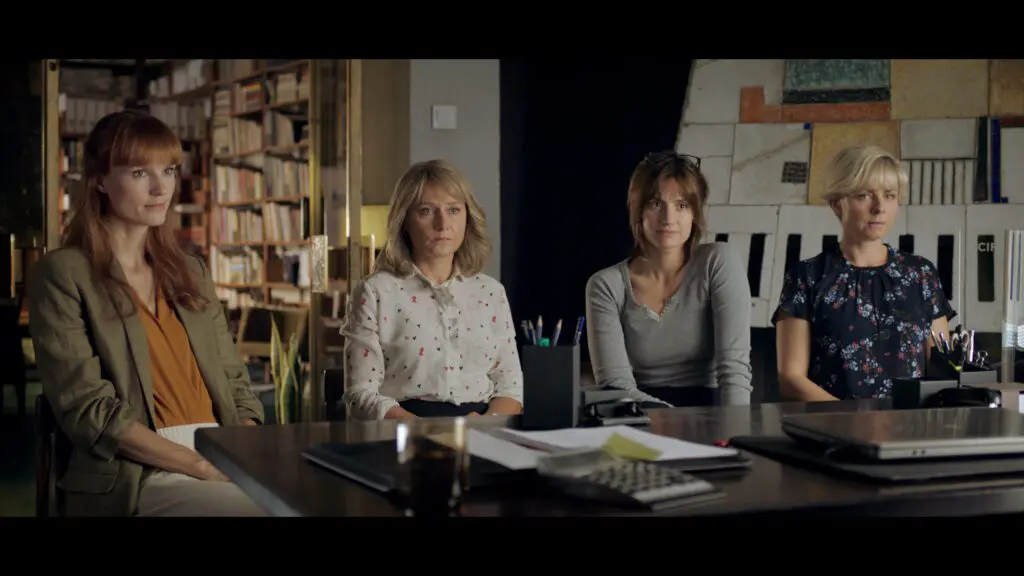Summary
A Danish drama/thriller about degrees of bullying and the impact people can have on each other. Plenty to admire and plenty to think about, but the writing in some scenes lets it down badly.
Four women work in the studious office of a non-governmental organization that investigates genocide and attempts to understand the people involved. Unlike many office-based dramas, there are no airheads in The Exception: these people are all intelligent and driven grown-ups, though each with their own human sensitivities. Yet when one of them starts to feel excluded by the others, her wariness grows into paranoia; and the others’ cliquey behavior steadily escalates into subtle bullying. All of this might have been manageable if it wasn’t for the death threats which start to arrive.
The four colleagues are well-drawn characters, each with issues of their own (though thankfully not the two-dimensional way). Iben (Danica Curcic) has a strong presence in the organization, perhaps to compensate for her crippling arthritis. Malene (Amanda Collin) has not long come back from a field trip to Africa, where she was taken hostage and is still suffering some serious flashbacks. Camilla (Lene Maria Christensen) is the team’s secretary, and clearly wants more fulfillment in her life and her work. Anne-Lise (Sidse Babett Knudsen) is the one who doesn’t fit: the librarian who works in her own office, away from both colleagues and customers, and so contrives ways to join in with office banter, but it just makes her look a little odd; I sympathized with her a great deal.
The acting on the part of the four is superb; not just Sidse Babett Knudsen (whose name, I confess, was what drew me to the film). She is visibly reduced by the understated (and perhaps unconscious, at first) gaslighting from her teammates; quite different to the roles she is known for in The Duke of Burgundy, Borgen, etc. Director Jesper W. Nielsen made excellent use of these actors’ strengths, taking us on a continual dance of each of them taking the focus for a time, which succeeds in making their dynamic intriguing.

What I admired most about The Exception though was the production style, and in three respects. Firstly, the remarkable building that the NGO occupied, which captured both light and the serious tone of the organization’s work beautifully. Secondly, Henrik Lindstrand’s music, which somehow held the film back from becoming melodramatic a couple of times. Most striking of all, though, was the way individual characters’ thoughts and feelings were presented on the screen as vivid imaginings. This was done just as effectively to raise the effect of PTSD on Iben, and frustrations and passions in a couple of the other women. Consequently, we had no difficulty seeing inside their heads (sometimes seeing more than they did themselves).
All this took place, of course, against the backdrop of tyranny and atrocity around the world. Serbian and Kenyan conflicts cropped up as subjects of articles Iben and Malene wrote, though they used other case studies to help understand the nature of evil. The Exception has plenty to say; though interestingly the characters making philosophical arguments have personal issues that may muddy their perspective. There is an obvious attempt to show the office conflict as something initially minor which got out of control; and also that it reflected the larger-scale conflicts the team was interested in. Unfortunately, blending different layers of a story made the central theme unclear: was it a drama about office personalities, a thriller about death threats and war criminals, a study of what makes people wield power over others, or a thesis about the bad things we do to each other (and then pretend to ourselves we didn’t)?
That weaving of themes may have worked if it wasn’t for one major flaw that frankly cheapened The Exception fatally. The overall plot had promise, the characters were strong, but the writing was poor: some scenes weak, and others downright far-fetched. Anne-Lise was first shown to be excluded from casual banter because no-one looked at the YouTube video she found funny; there must surely have been a better way to introduce this issue. In the second half of the film, there is a scene where one of the women breaks into a teammate’s home, in full cat burglar guise; and another which involves not being spotted by a colleague in her choir practice, involving hiding and setting off a smoke alarm. These scenes may fit a melodrama based on an airport paperback (such as Before I Go to Sleep), but the themes in The Exception deserve to be treated seriously. The film was written by Christian Torpe, based on a novel by Christian Jungersen; which I have not read, so I cannot comment on whether these daft scenes were there in the source, or if the screenwriter tried to give the book additional drama.
The Exception will be released across all major UK Digital Platforms on 22 January including iTunes, AppleTV, Sky Store, Google Play, Amazon, Virgin, Curzon Home Cinema & Chili (& BT on rental only from 1st Feb).




